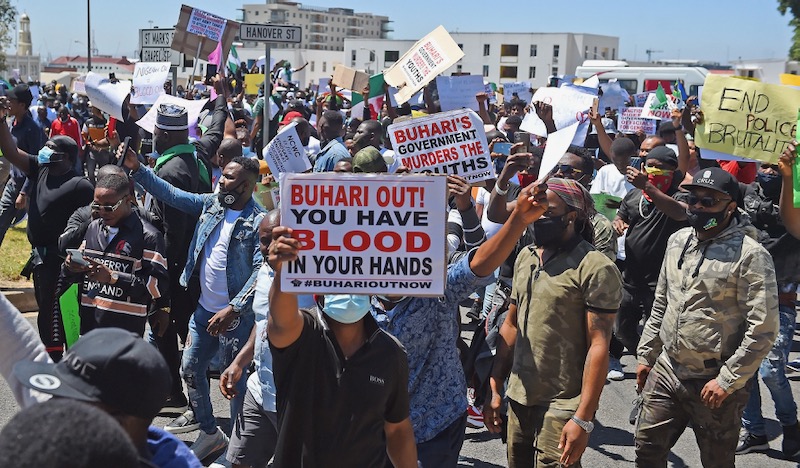Nigerian President Muhammadu Buhari is being accused of inept failure to address increasing insecurity in the country, following one of the worst terrorist massacres in recent times and the latest mass kidnapping of schoolchildren.
Armed men attacked a boys’ high school in northern Katsina State on the night of 11 December. More than 300 students remain unaccounted for in the chaos that followed. MrBuhari condemned “the cowardly bandits’ attack on innocent children” in a statement last Saturday. He said the military had located the kidnappers in a forest but offered no further details. School authorities were still trying to establish how many students had returned home and how many others could still be scattered across a large area after fleeing the attack. Parents gathered at the school pleaded with the authorities to help find their children.
Buhari has faced widespread criticism – including challenges from the country’s Catholic bishops – over increasing violence in Nigeria and the lack of a strategy to tackle it. Motorcycle gangs wielding guns and machetes operate with seeming impunity across the country, ransacking villages, kidnapping busloads of travellers and rendering highways all but impassable.
The abductions occurred days after the president cancelled an appearance before a joint session of the National Assembly, which had invited him to brief legislators on national security after an Islamist group massacred scores of farmers in northeastern Borno state at the end of last month.
Pope Francis prayed on 2 December for victims of this massacre of at least 110 farmers, of whom at least 30 were tied to trees and beheaded in their fields. “I want to assure my prayers for Nigeria, where blood has unfortunately been spilled once more in a terrorist massacre,” he said at a general audience. “May God welcome them in His peace and comfort their families, and convert the hearts of those who commit similar atrocities which gravely offend His name.” No group has claimed responsibility for the attack, but Boko Haram operates in the area and frequently attacks rural communities.
Amnesty International reported that more than 1,100 people were killed by terrorists and bandits in northern Nigeria in the first six months of this year, with the government failing to bring the attackers to justice. The violence has uprooted more than 200,000 people in the north-west from their homes. Killings in Katsina have doubled this year compared to 2019. “Northern Nigeria has never been hit this hard in the history of the country – on a daily basis, citizens are kidnapped, gruesomely murdered, and raped,” said Idayat Hassan, head of the Abuja-based Centre for Democracy and Development. “Life has become nasty and brutish under the Buhari administration.”
Archbishop Ignatius Kaigama of Abuja said in an extended statement on Monday: “The failure to protect the people is put squarely at the doorstep of the Federal Government that has lost the capacity to rein in sundry cartels of gunmen who now terrorise different places, particularly in the North, without let or hindrance.”
His full statement is published below:
Killings and Kidnappings in Katsina and Borno States, Nigeria
Archbishop of Abuja Ignatius Kaigama
The Incidents of killings and kidnapping currently going on in the country, is now posing a significant threat to all the citizens. Most kidnappings are financially motivated and conducted by criminal groups with varying levels of sophistication. It is currently unclear why the school in Katsina was targeted; however, attacks on schools and the kidnapping of students in northern Nigeria have been occurring with some degree of regularity. In the past, militant groups, such as Boko Haram and Islamic State West Africa Province, have been involved in attacks on educational facilities in northern Nigeria. Kidnapping incidents involving large groups of students within Nigeria usually take some time to resolve. Victims of ideologically motivated kidnappings face a higher threat of death and may experience longer times in captivity.
Right now, insecurity is the greatest challenge facing the nation. The level of incidents and the apparent impunity have become unacceptable and cannot be excused, for whatever reason. It has to observed that this level of insecurity can only be found in countries that are either at war or are experiencing some kind of social instability. It is intriguing that the Department of State Services and the Police, in particular, appear to be very dutiful in combating civil protests and arresting dissenters and this is while the nation is taken up in galling insecurity. The expertise of these agencies is demonstrable on the civilian population, but not on those who have picked up arms against the State.
It has to be stated that the primary responsibility of Government, as enshrined in the constitution, is the protection of lives and property of its citizens irrespective of ethnic and/or religious persuasion. Any breach of this fundamental principle of social contract contravenes the very reason for which Government exists. When a government loses the capacity to protect the lives and property of its citizens, it loses credibility and anarchy beckons.
The failure to protect the people is put squarely at the doorstep of the Federal Government that has lost the capacity to rein in sundry cartels of gunmen who now terrorise different places, particularly in the North, without let or hindrance. At this point, it should be clear to the authorities that the existing strategy to stem insecurity and foster peace, is not working and should either be looked into, improved or at best redesigned. In the recent past, some Senators have called on the President to sack the service chiefs and appoint new ones. The lawmakers deliberated on a motion on national security challenges and the need to restructure the nation’s security architecture. This, without question or doubt, will be a right step in the right direction
The government has to sit up and do the needful in ensuring that terrorists are checkmated, criminals rounded up, bandits dismantled, and kidnappers put out of business. This is the very least the citizens expect from their leaders. The rise and proliferation of many forms of “self-help” security organisations is a loud attestation to a vote of no confidence, as it were, on the authorities.
Boko Haram violence, kidnappings and banditry represent gross violations of human rights. It is important to pay attention to all the stages, processes and trends of the occurrences because they are interrelated. Structural injustices meted out to youths and minority groups are appalling, and if unchecked may lead us to a point of no return.
It appears that this time around Nigerian brinkmanship is being stretched to its limits by the latest upsurge in kidnappings and banditry in the country. As events of recent months have shown, it will only take a combination of efforts and strategies to frontally address the underlying causes of the kidnappings and banditry in the country. While the security personnel can do their level best, all hands should be on deck if the menace is to be scotched once and for all.



 Loading ...
Loading ...